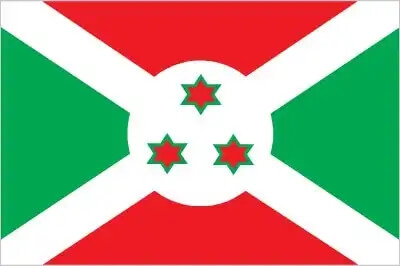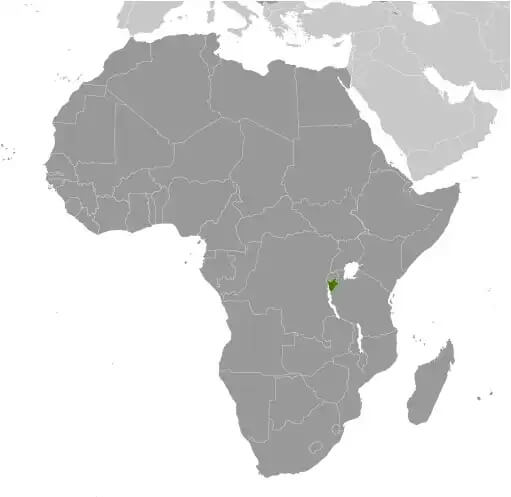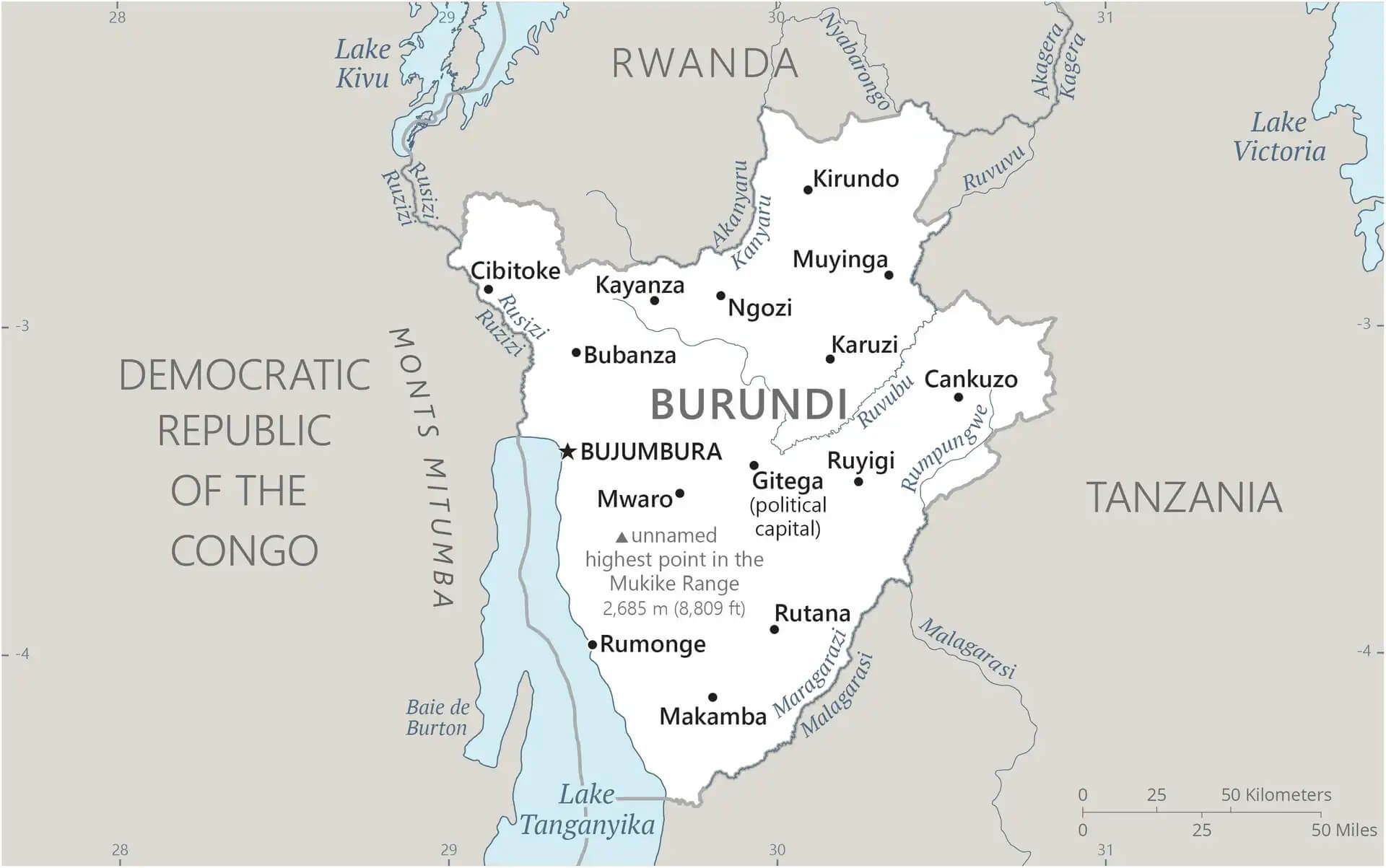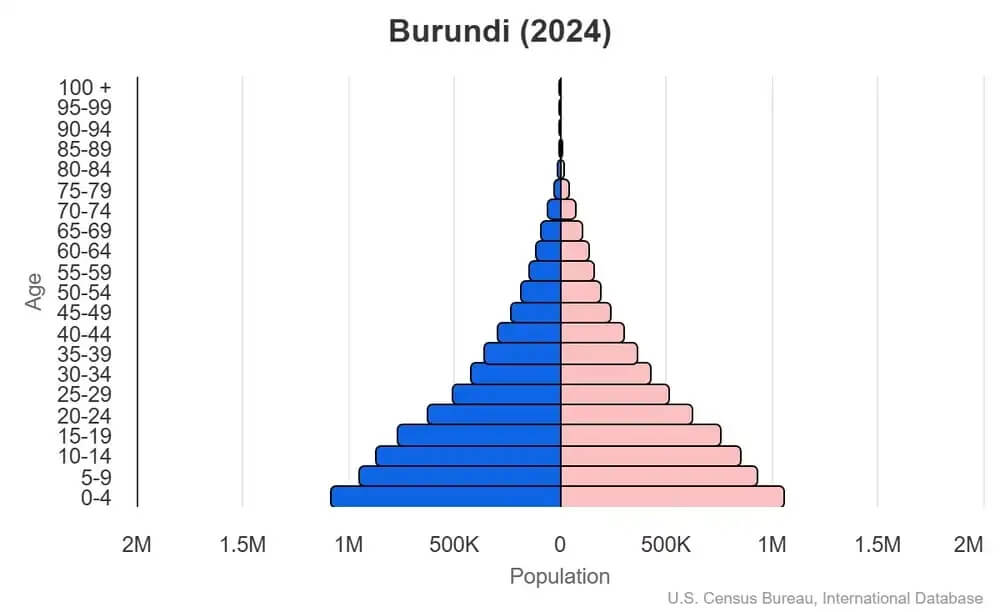World Book
Burundi
World Book Index
40


With a score of 40, the country is ranked 154th out of 158 countries in the World Book ranking. (more information)
Introduction
Burundi gained its independence from Belgium in 1962 as the Kingdom of Burundi, but the monarchy was overthrown in 1966 and a republic established. The assassination of Burundi’s president in 1993 triggered 12 years of ethnic violence between Hutu and Tutsi factions. Political violence and non-democratic transfers of power have marked much of Burundi's history.
Neighboring countries
Democratic Republic of the Congo - Rwanda - Tanzania
Geography
Area
total: 27,830 sq km
land: 25,680 sq km
water: 2,150 sq km
Climate
equatorial; high plateau with considerable altitude variation (772 m to 2,670 m above sea level); average annual temperature varies with altitude from 23 to 17 degrees Celsius but is generally moderate; average annual rainfall is about 150 cm with two wet seasons (February to May and September to November) and two dry seasons (June to August and December to January)
Natural resources
nickel, uranium, rare earth oxides, peat, cobalt, copper, platinum, vanadium, arable land, hydropower, niobium, tantalum, gold, tin, tungsten, kaolin, limestone
People and Society
Population
total: 13,590,102 (2024 est.)
Ethnic groups
Hutu, Tutsi, Twa, South Asian
Languages
Kirundi (official), French (official), English (official, least spoken), Swahili (2008 est.)
Religions
Christian 93.9% (Roman Catholic 58.6%, Protestant 35.3% [includes Adventist 2.7% and other Protestant religions 32.6%]), Muslim 3.4%, other 1.3%, none 1.3% (2016-17 est.)
Population growth rate
2.81% (2024 est.)
Government
Government type
presidential republic
Capital
name: Gitega (political capital), Bujumbura (commercial capital)
Executive branch
chief of state: President Evariste NDAYISHIMIYE (since 18 June 2020)
head of government: Prime Minister Nestor NTAHONTUYE (since 5 August 2025)
Diplomatic representation in the US
chief of mission: Ambassador Jean Bosco BAREGE (since 27 February 2024)
Diplomatic representation from the US
chief of mission: Ambassador Lisa PETERSON (since 27 June 2024)
Economy
Economic overview
highly agrarian, low-income Sub-Saharan economy; declining foreign assistance; increasing fiscal insolvencies; dense and still growing population; COVID-19 weakened economic recovery and flipped two years of deflation
Real GDP (purchasing power parity)
$11.739 billion (2024 est.)
$11.343 billion (2023 est.)
$11.048 billion (2022 est.)
Real GDP per capita
$800 (2024 est.)
$800 (2023 est.)
$800 (2022 est.)
Exports
$378.229 million (2023 est.)
$333.637 million (2022 est.)
$302.752 million (2021 est.)
Exports - partners
UAE 59%, Uganda 8%, China 5%, Germany 5%, USA 3% (2023)
Exports - commodities
gold, coffee, tea, tin ores, iron bars (2023)
Imports
$1.433 billion (2023 est.)
$1.42 billion (2022 est.)
$1.166 billion (2021 est.)
Imports - partners
Tanzania 26%, China 15%, Uganda 10%, Kenya 10%, India 6% (2023)
Imports - commodities
fertilizers, cement, packaged medicine, plastic products, cars (2023)
Human Development Index
The country's Human Development Index (HDI) is 0.439, ranking it 187th out of 193 countries tested. (more information)
World Happiness Report
The World Happiness Report ranked the country 142nd out of 158 countries tested with a score of 3.775. (more information)



